The 10 Healthiest Lean Proteins You Can Eat
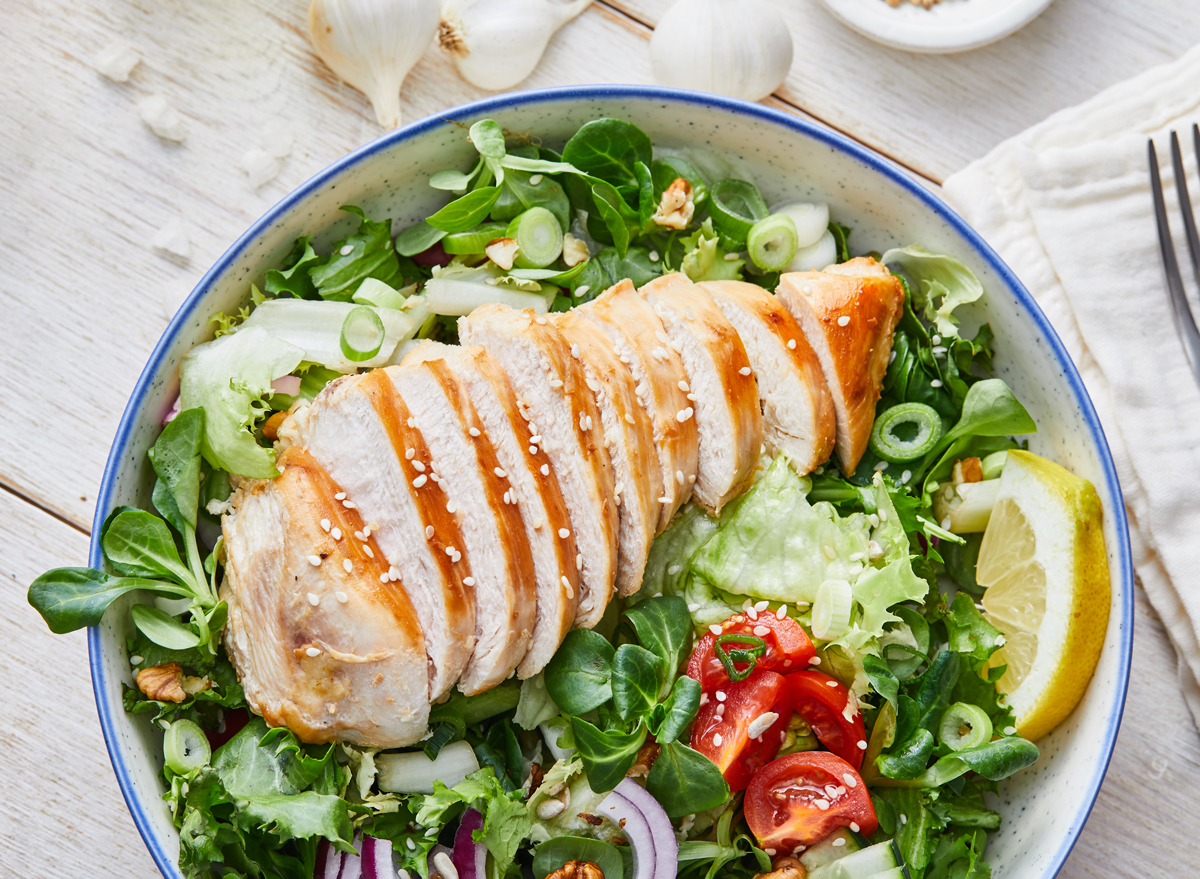
Looking to up your protein game in 2024? You’re in good company. Many health-conscious folks are boosting their protein intake to reduce body fat, gain lean tissue, and level up their health.
Including lean protein in your diet is a cornerstone of any health-promoting eating plan, especially if you’re aiming to manage your weight effectively. However, not all proteins are created equal. Protein-rich foods that are high in saturated fat, sodium, and other artificial ingredients (think high-fat or processed meats) can do more harm than good, increasing your risk for heart disease, systemic inflammation, metabolic diseases, and certain types of cancer.
Opting for lean proteins, like the ones we’ll explore below, can be a game-changer for your health. These foods, featuring staples like white fish and various plant-based options, can help tamp down inflammation and lower your risk for chronic conditions among many other health benefits.
Now, how did we define a “healthy” protein? While there is no official FDA definition, for this article on the best lean proteins, here are three criteria that I used:
- Low in Saturated Fat: A serving of lean protein needs to have less than 3 grams of saturated fat.
- Calorie-Controlled: A healthy protein shouldn’t break your calorie budget. A 3-ounce serving of lean protein should provide no more than 150 calories.
- No Questionable Ingredients: The healthiest lean proteins are those with little or no added ingredients.
So, let’s dig in and explore the healthiest lean proteins to power up your plate!
Cod
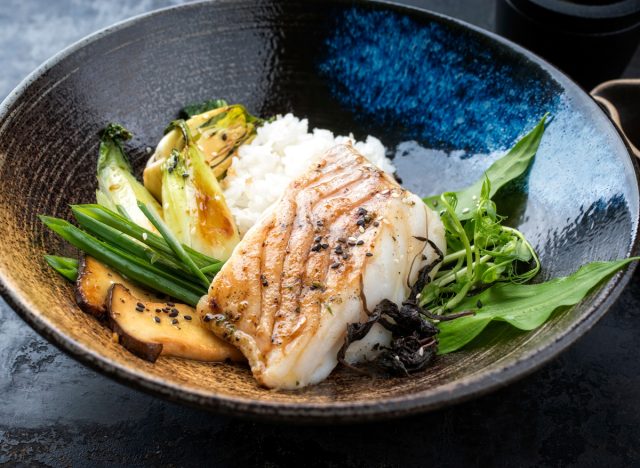
Cod is among the highest protein and lowest calorie seafood choices you can make. Since it is low in fat, the calories in cod are kept significantly lower than fatty fish like salmon, mackerel, or tuna. Cod is an excellent source of vitamin B12 and a good source of vitamin B6, which can provide cardiovascular benefits. Cod also provides a modest amount of omega-3 fatty acids that provide heart, eye, and brain health benefits.
Haddock
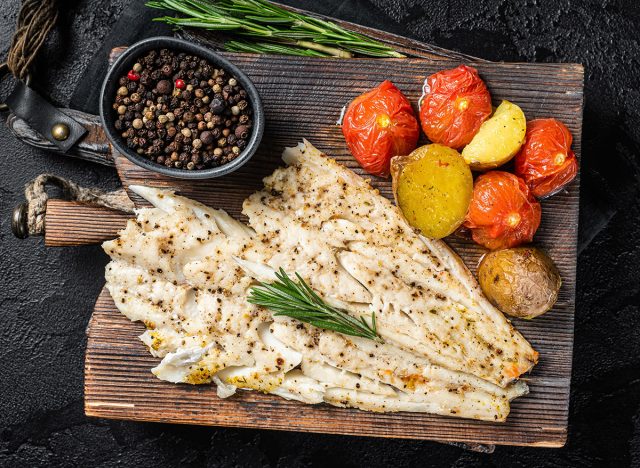
Haddock is another great white fish that is low in calories and fat, and rich in nutrients including B vitamins, selenium, and phosphorus. Haddock is also low in mercury compared to other types of seafood and it provides beneficial omega-3 fatty acids.
Chicken Breast
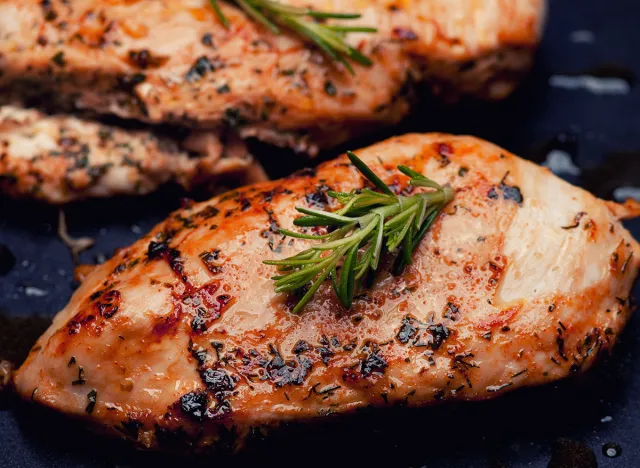
Chicken is the most popular animal-based “meat” protein enjoyed in the United States. Skinless chicken breast is an exemplary lean protein source that has gained popularity for its nutritional benefits and versatility. It’s low in fat, with just 2.5 grams of fat per 3-ounce serving and just 1 gram is the harmful saturated fat. With about 10 grams of protein per ounce, a 3-ounce serving packs nearly 30 grams of high-quality protein with all essential amino acids.
Enjoying chicken breast without the skin helps shave some fat and calories. Whether grilled, baked, or sautéed, skinless chicken breast can be a staple in a nutritious and lean, protein-rich diet. Research published in the journal Nutrients reported that some observational human studies show that enjoying chicken in place of higher-fat red meats may help with weight management and reduce the risk for cardiovascular disease and type 2 diabetes.
Turkey Breast
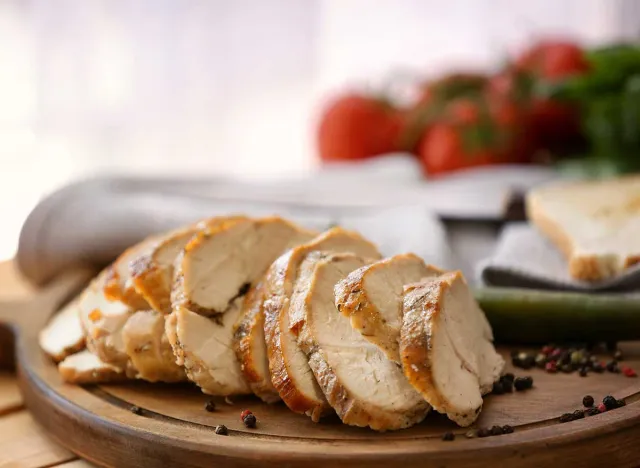
Even leaner than chicken breast, turkey breast is a top choice to pack in more protein per calorie. It’s an ideal choice if you’re trying to lose weight turkey can help you stay fuller for longer. Turkey’s mild and slightly sweet flavor lends itself to a variety of cooking methods, from roasting and grilling to incorporating it in sandwiches or salads. Nutritionally, turkey breast delivers includes potassium, manganese, zinc, selenium, and B vitamins. A meal with 25-30 grams of protein is ideal for most adults; having more than 30 grams at once will not provide any additional benefits and may lead to increased body fat if calories exceed your daily budget.
Fat-Free Cottage Cheese
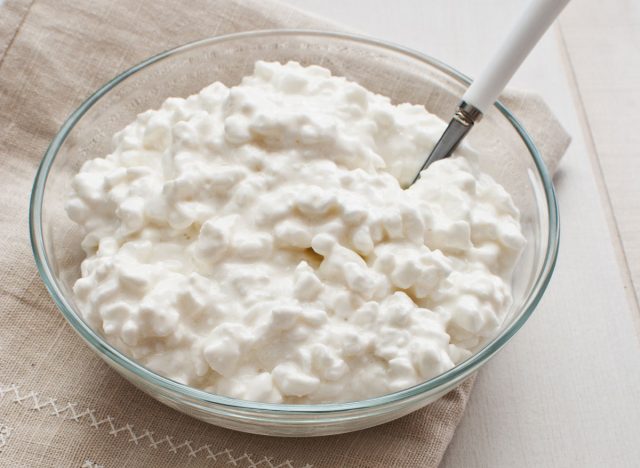
Fat-free cottage cheese is a great choice to pile on the protein without adding extra fat or calories to your diet. Cottage cheese is rich in casein, the slow-to-digest dairy protein. (Whey is the other main dairy protein that is quickly digested.) Because it takes longer to digest compared to whey, cottage cheese can enhance satiety and reduce cravings to help you stick with your resolve to eat well. Having cottage cheese after a workout is an ideal time to help muscles repair and rebuild muscles. What’s more, cottage cheese provides protein, calcium, and it supplies essential vitamins and minerals like phosphorus, potassium, calcium, and vitamin B12. According to research, cottage cheese and other dairy foods help build and maintain your bones, lower blood pressure, and reduce the risk for certain types of cancer. Plus, cottage cheese provides beneficial probiotics that support your GI tract health.
Egg Whites

A study in the journal Foods reported that egg protein has an amino acid score of 100, indicating it’s the most absorbable type of protein you can eat. Studies show that egg white protein can help build strength, lower harmful LDL cholesterol, and reduce body fat. Egg whites have a great calorie-to-protein ratio because they are essentially fat-free. A great way to enjoy egg whites is to combine them with 1 whole egg, as the yolk is where vitamins A, D, E, and B vitamins, lutein, zeaxanthin, and many other essential nutrients are contained.
Nonfat Plain Greek Yogurt
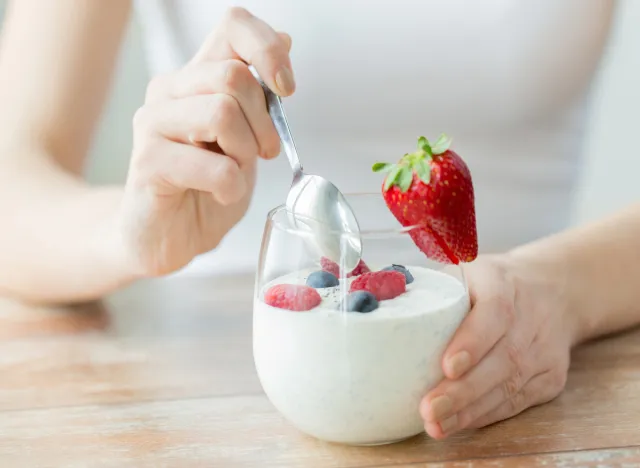
If you want to up the pro in your diet, non-fat Greek yogurt is a must-have. Traditional Greek yogurt is strained to lose the watery whey, resulting in a richer, thicker creamier yogurt with twice the protein and less sugar than traditional yogurt. Be sure to choose plain rather than flavored to keep calories and added sugar low. A 6-ounce serving of plain, nonfat Greek yogurt packs in as nearly as much protein as three eggs. Greek yogurt can also help you gain muscle mass and reduce body fat as part of a strength training program, according to a study published in Frontiers in Nutrition.
Firm Tofu
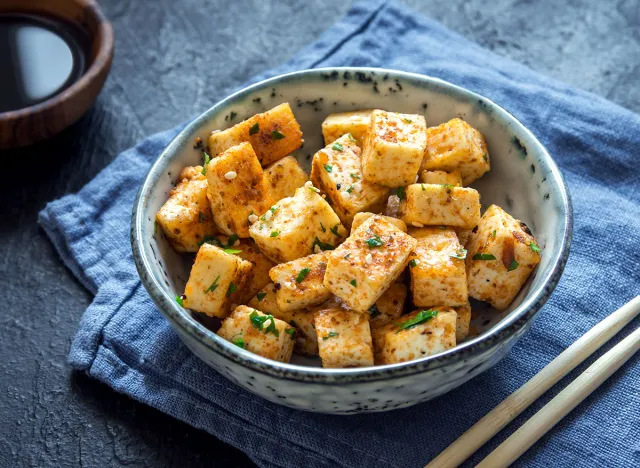
For plant-based protein, tofu is a great option as it contains all nine essential amino acids like animal-based protein foods. What’s more, tofu is nutrient-rich and provides calcium, iron, magnesium, and B vitamins. Tofu is made from curdled soy milk like the cheese-making process. Soy foods contain isoflavones, which are known to help tamp down inflammation and they have been shown to reduce the risk for chronic conditions, including heart disease, certain types of cancer, and type 2 diabetes. A recent study published in In Vivo found that the consumption of soy foods reduced the risk of breast cancer among pre- and post-menopausal women.
Cooked Lentils
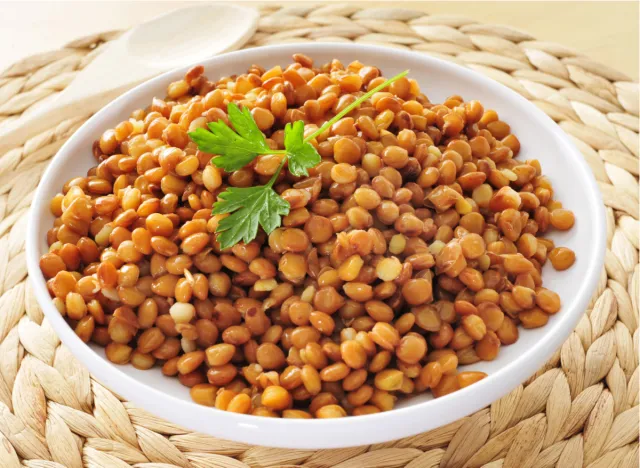
Lentils, a versatile and nutrient-dense legume, offer a wealth of health benefits due to their impressive protein content and nutrients, and they are rich in polyphenols. Due to the amount of protein in lentils, they help with muscle growth and maintain a healthy immune system. According to research in the International Journal of Molecular Sciences, polyphenol-rich lentils polyphenol-rich lentils have antidiabetic, anti-obesity, anti-hyperlipidemic, anti-inflammatory, and anticancer properties. They are also rich in fiber, aiding in digestive health and promoting a feeling of fullness, making them a valuable component in weight management. Lentils also contain a range of vitamins and minerals, including iron, folate, and potassium.
Chickpeas (Garbanzo beans)
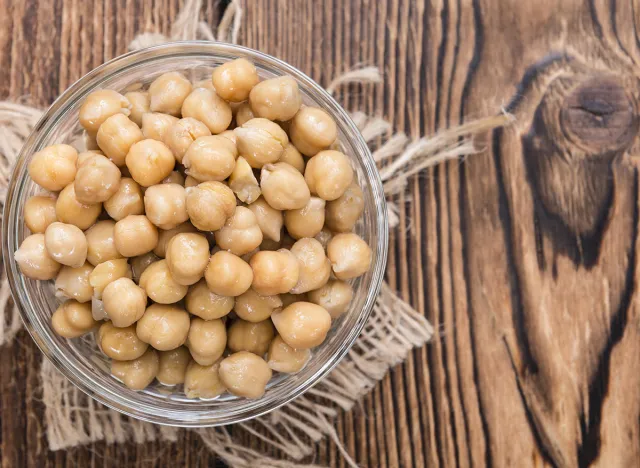
Chickpeas, (aka garbanzo beans), are lean proteins that are packed with fiber and nutrients like iron manganese, zinc, B vitamins, magnesium, and chickpeas help maintain stable blood sugar levels, aid in weight loss and maintenance, improve your heart health, and bolster your GI tract microbiome. A study published in the journal Nutrients reported that the resistant starch in chickpeas can help feed beneficial bacteria in the GI tract to help improve overall metabolic health.
- Source: https://fdc.nal.usda.gov/fdc-app.html#/food-details/2341660/nutrients
- Source: https://fdc.nal.usda.gov/fdc-app.html#/food-details/174198/nutrients
- Source: Connolly, G., & Campbell, W. W. (2023). Poultry Consumption and Human Cardiometabolic Health-Related Outcomes: A Narrative Review. Nutrients, 15(16), 3550. https://doi.org/10.3390/nu15163550
- Source: https://fdc.nal.usda.gov/fdc-app.html#/food-details/171496/nutrients
- Source: https://fdc.nal.usda.gov/fdc-app.html#/food-details/172181/nutrients
- Source: Thorning, T. K., Raben, A., Tholstrup, T., Soedamah-Muthu, S. S., Givens, I., & Astrup, A. (2016). Milk and dairy products: good or bad for human health? An assessment of the totality of scientific evidence. Food & nutrition research, 60, 32527. https://doi.org/10.3402/fnr.v60.32527
- Source: Matsuoka, R., & Sugano, M. (2022). Health Functions of Egg Protein. Foods (Basel, Switzerland), 11(15), 2309. https://doi.org/10.3390/foods11152309
- Source: https://fdc.nal.usda.gov/fdc-app.html#/food-details/323697/nutrients
- Source: https://fdc.nal.usda.gov/fdc-app.html#/food-details/330137/nutrients
- Source: Bridge, A., Brown, J., Snider, H., Nasato, M., Ward, W. E., Roy, B. D., & Josse, A. R. (2019). Greek Yogurt and 12 Weeks of Exercise Training on Strength, Muscle Thickness and Body Composition in Lean, Untrained, University-Aged Males. Frontiers in nutrition, 6, 55. https://doi.org/10.3389/fnut.2019.00055
- Source: https://fdc.nal.usda.gov/fdc-app.html#/food-details/173788/nutrients
- Source: Boutas, I., Kontogeorgi, A., Dimitrakakis, C., & Kalantaridou, S. N. (2022). Soy Isoflavones and Breast Cancer Risk: A Meta-analysis. In vivo (Athens, Greece), 36(2), 556–562. https://doi.org/10.21873/invivo.12737
- Source: https://fdc.nal.usda.gov/fdc-app.html#/food-details/172421/nutrients
- Source: Ganesan, K., & Xu, B. (2017). Polyphenol-Rich Lentils and Their Health Promoting Effects. International journal of molecular sciences, 18(11), 2390. https://doi.org/10.3390/ijms18112390
- Source: https://fdc.nal.usda.gov/fdc-app.html#/food-details/173801/nutrients
- Source: Kadyan, S., Sharma, A., Arjmandi, B. H., Singh, P., & Nagpal, R. (2022). Prebiotic Potential of Dietary Beans and Pulses and Their Resistant Starch for Aging-Associated Gut and Metabolic Health. Nutrients, 14(9), 1726. https://doi.org/10.3390/nu14091726









